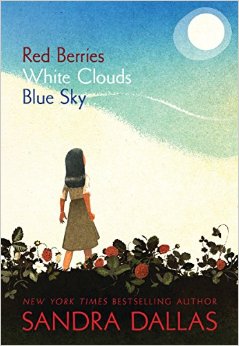June 24, 2015
A children’s ebook about incarceration is currently available as part of a free summer reading program being offered by OverDrive, a company that provides electronic book services for many libraries across the country. The book—Sandra Dallas’s Red Berries, White Clouds, Blue Sky—can be borrowed electronically from libraries around the country until July 9. Chances are, you live near a public library that offers this program. I was able to borrow the book seamlessly through the Hawaii Public Libraries.
Red Berries, White Clouds, Blue Sky—published in 2014 by Sleeping Bear Press—is intended for eight to 11-year-old readers and features a 12-year-old Nisei protagonist named Tomi Itano, who is incarcerated at the fictional Tallgrass camp in Colorado during World War II. The story begins prior to the war, when we meet Tomi, her implausibly Americanized Issei parents Sam and Sumiko, and her brothers, 16-year-old Roy and seven-year-old Hiro. The family lives on a strawberry farm in Southern California, renting the land from a friendly white family, the Lawrences, whose daughter Martha is Tomi’s best friend. The coming of the war brings upheaval: Sam is arrested and interned, and the rest of family is forcibly removed first to Santa Anita, then to Tallgrass, which was based on the Amache camp in Colorado. Episodic chapters tell of the family’s adjustment to incarceration, their new friends and neighbors, and the unexpected problems that occur when an embittered Sam rejoins the family.
Though the story arc is simple and predictable, it is generally well told and is mostly true to the facts of the incarceration. As such it can serve as a good introduction to the topic for children of the appropriate age. Its strength is in its depiction of women’s and girls’ experiences in camp. We see how the incarceration—and the absence of her husband—empower Sumiko, who is forced to take on a more assertive role and ends up teaching sewing and quilting at the camp. We also meet other women who band together to help each other make the best of the bad situation. Tomi herself proves to be a resourceful and optimistic young woman. However, her father’s return, along with the grind of continued incarceration, combine to temper her optimism and her attitude darkens before a concerned teacher intervenes.
While the female characters are robust and multidimensional, the male characters are mostly underdeveloped. Sam goes from super patriot to embittered dissident in the blink of an eye and ends up effectively as the villain of the story. Roy is also a bit of a cypher, as we learn little about him beyond his love of music and get little background about his decision to enlist in the army.
As with nearly all fictional accounts of the incarceration, there are various instances of errors/implausibilities/dramatic license, though most are minor in this case. Sam’s arrest—seemingly just for having the sorts of Japanese items in the house that just about any Issei woud have—is implausible and his later internment in a California camp couldn’t have happened, as there were no Justice Department administered detention camps in the West Coast restricted area. Two of the families living near the Itanos are from San Francisco, which would have made it very unlikely for them to have been in Amache. The floors in the barracks are described as being made of wood, whereas Amache was the only War Relocation Authority concentration camp with brick floors. Two soldiers from Tallgrass who had been wounded and discharged march in a 1944 Fourth of July parade in the camp, which is unlikely given that the earliest volunteers from the camps didn’t see battle until May of 1944. Ralph Carr is still governor in the spring of 1945 in the book, whereas in reality he left office in 1942.
Author Sandra Dallas is a long time resident of Colorado and has written about many aspects of the history of American West in her thirteen novels and two children’s books. In her blog post on the OverDrive site, she writes that learned much about the history of the West from novels she read as a child, including the multicultural adventures by Florence Crannell Means, whose pioneering camp novel The Moved-Outers (1945) seems like a direct inspiration. Dallas had written a prior adult novel centered on the camp experience titled Tallgrass (2007), which told the story from the perspective of a white teenager and her family who lived in the small town neighboring the camp. In a nice touch, several characters from the earlier book make brief appearances in the current one.
Read the Red Berries, White Clouds, Blue Sky ebook for free through OverDrive and your public library through July 9.
